Return to Cliff Pickover's main web page.
Information on Cliff's other books is here.
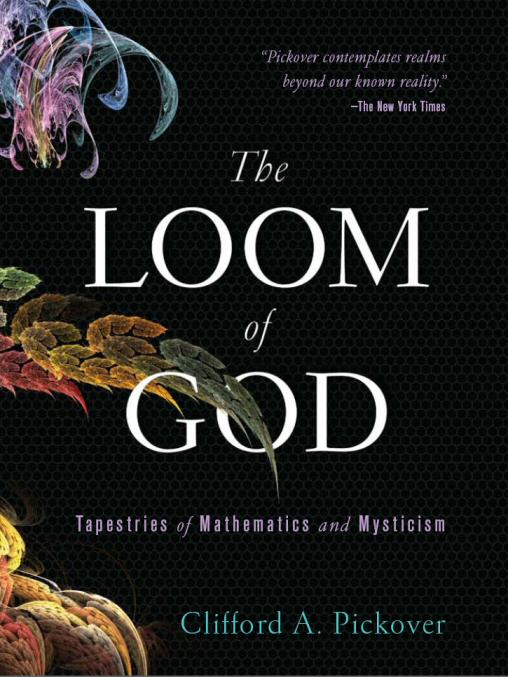
 Now at Amazon.Com Now at Amazon.Com 
"Pickover contemplates realms beyond our known reality."
-- The New York Times
"Pickover inspires a new generation of da Vincis to build unknown flying machines and create new Mona Lisas."
-- Christian Science Monitor
"Pickover has done it again, with a marvelously entertaining, historical romp
through the unexpected connections between mathematics and mysticism."
-- Paul Hoffman, Discover
"Without peer as an idea machine, Cliff Pickover proves equally adept at writing,
The Loom of God is a well-crafted piece of mathematical science fiction."
-- Charles Aschbacher, Journal of Recreational Mathematics
"If you ever doubted that science and religion have commonality, this is the book for you.
In The Loom of God, Cliff Pickover, in his irrepressible style,
frolics through a forest of mathematical curiosities and historical tidbits,
all skillfully woven into a futuristic fantasy, leaving you to wonder where he learned all that."
-- Julien C. Sprott, Professor of Physics
|
The Loom of God
Tapestries of Mathematics and Mysticism
Clifford A. Pickover,
Sterling Publishing, updated 2009 paperback edition
(Buy at Amazon.Com)
Book Praise
"As far as I know, Clifford Pickover is the first mathematician to write a book about areas where math and theology overlap. Are there mathematical proofs of God? Who are the great mathematicians who believed in a deity? Does numerology lead anywhere when applied to sacred literature? Pickover covers these and many other off-trail topics with his usual verve, humor, and clarity. And along the way the reader will learn a great deal of serious mathematics."
-- Martin Gardner
"Pickover's lively, provocative travel guide takes readers into the fascinating realm of mystic math, from perfectly strange numbers to fractured geometries and other curious nooks and crannies of ancient worlds and modern times."
-- Ivars Peterson, Author of The Mathematical Tourist
"Chock-full of mathematical treats, The Loom of God takes you on a trip which explores ideas in a totally non-threatening, enjoyable format. Entertaining and informative adventure of Pickover's fictional characters -- Theano and Mr. Plex -- bring to life such things as: the golden mean, spirals in hyperspace, the Inca quipus, string theory, the wild and diverse world of numbers. A must for the I-hate-math person as well as the mathematical explorer."
-- Theoni Pappas, author of The Joy of Mathematics
|

"Bucky Fuller thought big, Arthur C. Clarke thinks big, but Cliff Pickover outdoes them both."
-- WIRED
"A perpetual idea machine, Clifford Pickover is one of the most creative, original thinkers in the world today."
-- Journal of Recreational Mathematics
|
The Loom of God bridges the gulf that has so long divided mathematics and religion. In a blend of science, science fiction, history, and dazzling computer imagery,
I help the reader understand mystical relationships between numbers, God, and the mathematical fabric of our universe.
From the mysterious cult of Pythagoras, to the awesome mechanics of Stonehenge, to the fearsome gargoyles and glorious fractals created
on the computer screens of today, I explain the power of numbers and their connection with the search for the ultimate meaning and Apocalypse of the universe.
Clifford A. Pickover is the author of forty books on such topics as computers and creativity, art, mathematics, black holes, human behavior and intelligence, time travel, alien life, religion, medical mysteries, and science fiction. Pickover is a prolific inventor with over forty patents, is the associate editor for several journals, and puzzle contributor to magazines geared to children and adults. He lives outside New York City.
|
Alex Grey
My favorite artist is
Alex Grey
who has given me permission
to use his illustrations in my new book The Loom of God published by Sterling.
The sample
images shown here are from my book, and they originally appeared in
Alex Grey's Sacred Mirrors: The
Visionary Art of Alex Grey (Inner Traditions International:
Rochester, Vermont). The images are used in my book with permission of Alex Grey.
Please do not take these copyrighted images.
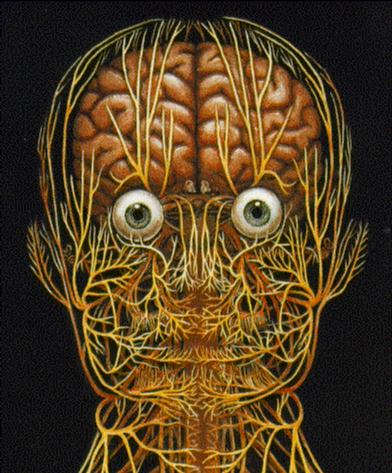
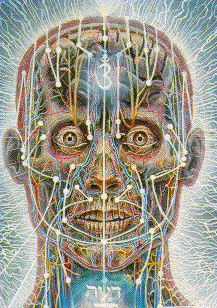
Table of Contents
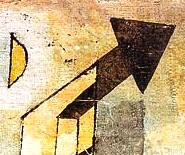
1 Are Numbers Gods?
2 The End of The World
3 Pentagonal Numbers
4 Doomsday: Friday 13, November, A.D. 2026
5 666,666, Gnomons, and Oblong Numbers
6 St. Augustine Numbers
7 Perfection
8 Turks and Christians
9 The Ars Magna of Ramon Lull
10 Death Stars, a Prelude to August 21, 2126
11 Stonehenge
12 Urantia and 5,342,482,337,666
13 Fractals and God
14 Behold the Fractal Quipu
15 The Eye of God
16 Number Caves
17 Numerical Gargoyles
18 Astronomical Computers in Canchal de Mahoma
19 Kabala
20 Mathematical Proofs of God's Existence
21 Eschaton Now
22 Epilogue
Postscript 1. Goedel's Mathematical Proof of God's Existence
Postscript 2. Mathematicians Who Were Religious
Postscript 3. Author's Musings
Smorgasbord for Computer Junkies
How the World Will End
 A portion of the book The Loom of God deals with ways
in which the world will end. Click
here
for more information.
A portion of the book The Loom of God deals with ways
in which the world will end. Click
here
for more information.
More Reviews for the Loom of God

"The book is about computers, art, mathematics and religion.
It melds science with science fiction, astronomy with mysticism.
Pickover's goal is nothing less than to help shape
readers' views of reality itself."
- ACM Membernet
"Clifford A. Pickover leads readers on a dazzling, lushly
illustrated tour of the intersection of number and the
numinous."
- Publisher's Weekly
"A scientist, author, artist, and occasional inventor, among other
things, Clifford Pickover's resume probably really could fill a book.
For brevity's sake, let's just say with eight books (and five more
forthcoming), several hundred magazine articles, numerous editorships,
and two US patents, in addition to his job as a researchers at the IBM
Watson Research Center, Pickover keeps busy."
- Implosion, #6
"How many hours are there in the day of Clifford Pickover? He is on
the research staff at IBM; he edits a number of journals; he has
written popular books and apparently he has read everything worth
reading. His latest achievement is best describe as science disguised
as science fiction. It appears to be odyssey through time from the
Greece of Pythagoras to the end of the world, but the accompanying
explanations justify his theme: "Mathematics is the Loom upon which
God weaves the Fabric of the Universe."... Pickover has since
collaborated on a novel with the prolific Piers Anthony, and the
combination of Pickover's theory and Anthony's fantasy should yield an
intellectual tour de force without precedent."
- West Coast Review of
Books
"I do not know if God is a mathematician, but mathematics is the loom
upon which God weaves the fabric of the universe," writes Clifford
Pickover in this intriguing examination of the link between religion
and numbers. This is not so much a unified narrative as a loosely
linked series of discussions about computers, fractals, Stonehenge,
Kabbalism, and the End of the World. Why is it that famous math-minds
like Pythagoras, Pascal, and Newton were also devoted believers? Or
that various faiths seem so preoccupied with numerology? Pickover
doesn't offer any easy answers, but this volume--handsomely
illustrated with old woodcuts and other graphics--will appeal to
readers who enjoy numerical games (such as the "Brain Bogglers" column
in Discover magazine, which Pickover often writes) and thinking about
the big questions in life.
- Amazon.com Current Events Expert Editor's Recommended Book
The
Loom of God takes an entertaining, indeed playful, look at numbers and
mathematical patterns and the mystical properties that have often been
ascribed to them. Clifford Pickover takes you on a romp through
numerological history, introducing both its characters (such as the
great mathematician Pythagoras) and its concepts: triangle numbers,
"perfect" numbers, Fibonnaci numbers, and more. Pickover describes
how ancient--and sometimes no-so-ancient--cultures and religions
interpreted the significance of various numbers; he examines the
geometry of Stonehenge and considers the probability of earth's
annihilation by collision with an asteroid. While many authors could
chronicle the history of mathematics and its relationship with
mysticism and religion, few could do it with the verve and flair that
Pickover manages.
- Amazon.com Science Expert Editor's Recommended Book
"At first glance you might believe you need a doctorate in
mathematics to enjoy this book. Well, you most certainly do not!
You can be terrified by math when you start to read, but at the
end you will be enlightened. Exceedingly interesting..."
- Baelder (UK)
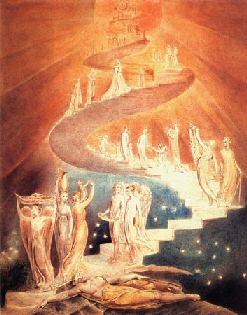 "Pickover is either the most brilliant mind since Socrates, or the
biggest lunatic since Marshall Applewhite took his Heaven's Gate
followers out to meet the spaceship behind Comet Hale-Bopp. This book
mixes science and philosophy with a large dash of humor, a cupful or
religion, a teaspoon of whimsy... The book is funny and exasperating,
entertaining and baffling. Pickover hops from Pythagoras, the Incans,
Stonehenge, Kabala, chakras, St. Augustine, and fractals with abandon.
You hopscotch throughout space and time, interacting with range of
historical figures from the Ice Age to the future. By the way, if
you'd like to note it in your planner, mathematics tell us the End of
the World is scheduled for August 15, 2126. Be there or be square."
"Pickover is either the most brilliant mind since Socrates, or the
biggest lunatic since Marshall Applewhite took his Heaven's Gate
followers out to meet the spaceship behind Comet Hale-Bopp. This book
mixes science and philosophy with a large dash of humor, a cupful or
religion, a teaspoon of whimsy... The book is funny and exasperating,
entertaining and baffling. Pickover hops from Pythagoras, the Incans,
Stonehenge, Kabala, chakras, St. Augustine, and fractals with abandon.
You hopscotch throughout space and time, interacting with range of
historical figures from the Ice Age to the future. By the way, if
you'd like to note it in your planner, mathematics tell us the End of
the World is scheduled for August 15, 2126. Be there or be square."
- American Reporter
"Discover's resident mathematician and brain teaser takes on the
greatest puzzle of them all: the relation of science to God and
religion. From Pythagoras and his strange beliefs ("Don't eat food
that causes you to flatulate") to Goedel's mathematical proof of the
existence of God, Pickover guides the reader through the history of
metaphysical logic. He explains fractals, lists mathematicians who
were religious, and explores Stonehenge, Inca counting, gargoyles,
craters, and the Kabala. Playful and surreal, The Loom of God is
accessible to anyone who's mastered long division."
- Discover magazine
"This is the most recent addition to a fast growing series of books by
Clifford Pickover, blending computers, science, art, and each time at
least one special topic of general interest. This time the motto of
the book is, "I do not know if God is a mathematician, but mathematics
is the loom upon which God weaves the fabric of the universe."
-- Pickover can discuss the most serious matters playfully and can take a
fresh look at topics that generally would be considered
over-discussed. In this book he discusses questions that seemingly
overlap between mathematics and theology. He does this though with a
characteristic wink.
-- The reader ends up with a lot of entertaining mathematics and very
little theology in the traditional sense of the word. Whether there
is a mathematical proof of the existence of God appears to be a much
more important question than the question itself whether God exists in
the first place. The book is full of beautiful graphics, both
classical from Dover volumes and those, generated by computer, famous
and not so well-known quotations, imaginary characters, reader's fan
mail referring to Pickover's previous books, and his trademark
Smorgasbord for Computer Junkies. Pickover appears, again, as an
unusual an uninhibited author in several innovative features of this
volume, such as the involvement of many partners, as co-authors,
through the Internet. Such a book, as The Loom of God, could not have
been imagined 30 ago, and could not have been produced even 10 years
ago. Today, it is all possible, and there seems to be a strong market
for it. In this connection, we could paraphrase what George M. Cohan,
the King of Broadway in the first half of this century answered when
asked about the secret of his success, but his words have direct
relevance without change. He said something like, "I am an ordinary
guy who knows what ordinary guys like." This is what makes Pickover,
like Cohan, extraordinary."
- Leonardo
An excellent gateway to the subject.
Accessible to the general reader,
the book is recommended for those intrigued by mathematical
patterns and interested in speculative, at times eccentric,
reasoning.
- Choice
"Thought-provoking, entertaining, eerie, magical, and lively are words
that describe The Loom of God, which weaves number theory, geometry,
and computer power into a beautiful tapestry of numerology, fractals,
and a fantasy of our world's future. Distinctive... dazzling...
unconventional... lets your imagination run wild... great for
recreational enrichment reading."
- Mathematics Teacher
"Those looking for unusual and bizarre applications of
mathematics will enjoy and be fascinated by Pickover's book."
- Yale Scientific
"Mathematics is the loom upon which God weaves the fabric of the
universe." How are mathematics and religion related? Pickover has
tackled a tough topic and written a very engaging book. He begins
with Pythagoreanism, explores numerology and kabala, finds fractals in
mandalas and in quipus, investigates the geometry of Stonehenge, and
considers "mathematical" arguments for the existence of God...
Happily, there is no mention of the modern mysticism of the Great
Pyramid... Each chapter beings with an episode of science fiction
(people from the future visit the past) and ends with a section on
"The Science behind the Science Fiction."
- Mathematics Magazine
Clifford Pickover has more than enough imagination for a hundred regular people. An enormously prolific author, his work includes technical books on computing and scientific visualisation, science fiction, and popular works on mathematics and a wide variety of scientific topics. This book explores the boundary between mathematics and religion, including Pythagorean cults, Stonehenge, cave paintings from 20,000 years ago which may be the first numbers, the Kabala, the quipu of the Incas, numerology, eschatology, and real-world doomsday scenarios, along with a wide variety of puzzles in number theory, geometry, and other mathematical topics. One of the many fascinating unsolved problems he discusses is the �integer brick�, which seems to be more often referred to as the �perfect cuboid�: can you find a three-dimensional rectangular parallelopiped in which all the edges and face and space diagonals are integers?
(Review is continued here.)
Return to Cliff Pickover's main web page.
Information on Cliff's other books is here.

 Now at Amazon.Com
Now at Amazon.Com 





 "Pickover is either the most brilliant mind since Socrates, or the
biggest lunatic since Marshall Applewhite took his Heaven's Gate
followers out to meet the spaceship behind Comet Hale-Bopp. This book
mixes science and philosophy with a large dash of humor, a cupful or
religion, a teaspoon of whimsy... The book is funny and exasperating,
entertaining and baffling. Pickover hops from Pythagoras, the Incans,
Stonehenge, Kabala, chakras, St. Augustine, and fractals with abandon.
You hopscotch throughout space and time, interacting with range of
historical figures from the Ice Age to the future. By the way, if
you'd like to note it in your planner, mathematics tell us the End of
the World is scheduled for August 15, 2126. Be there or be square."
"Pickover is either the most brilliant mind since Socrates, or the
biggest lunatic since Marshall Applewhite took his Heaven's Gate
followers out to meet the spaceship behind Comet Hale-Bopp. This book
mixes science and philosophy with a large dash of humor, a cupful or
religion, a teaspoon of whimsy... The book is funny and exasperating,
entertaining and baffling. Pickover hops from Pythagoras, the Incans,
Stonehenge, Kabala, chakras, St. Augustine, and fractals with abandon.
You hopscotch throughout space and time, interacting with range of
historical figures from the Ice Age to the future. By the way, if
you'd like to note it in your planner, mathematics tell us the End of
the World is scheduled for August 15, 2126. Be there or be square."